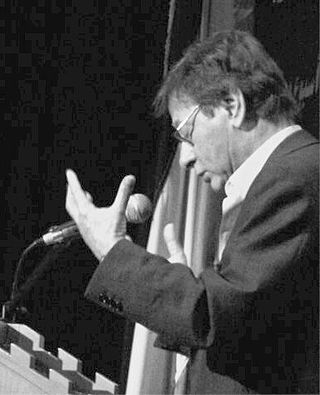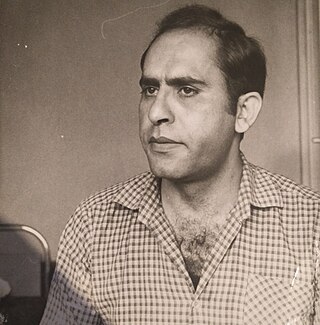
The Lebanese Civil War was a multifaceted armed conflict that took place from 1975 to 1990. It resulted in an estimated 150,000 fatalities and led to the exodus of almost one million people from Lebanon.

The Amal Movement is a Lebanese political party and former militia affiliated mainly with the Shia community of Lebanon. It was founded by Musa al-Sadr and Hussein el-Husseini in 1974 as the "Movement of the Deprived." The party has been led by Nabih Berri since 1980. The Greek Catholic Archbishop of Beirut, Grégoire Haddad, as well as Mostafa Chamran, were among the founders of the movement.

Mahmoud Darwish was a Palestinian poet and author who was regarded as Palestine's national poet.
The War of the Camps, was a subconflict within the 1984–1990 phase of the Lebanese Civil War, in which the Palestinian refugee camps in Beirut were besieged by the Shia Amal militia.

Elias Khoury was a Lebanese novelist and advocate of the Palestinian cause. His novels and literary criticism have been translated into several languages. In 2000, he won the Prize of Palestine for his book Gate of the Sun, and he won the Al Owais Award for fiction writing in 2007. Khoury also wrote three plays and two screenplays.

The Palestine Liberation Army is ostensibly the military wing of the Palestine Liberation Organization (PLO), set up at the 1964 Arab League summit held in Alexandria, Egypt, with the mission of fighting Israel. However, it has never been under effective PLO control, but rather it has been controlled by its various host governments, usually Syria. Even though it initially operated in several countries, the present-day PLA is only active in Syria and recruits male Palestinian refugees.
The Cairo Agreement, or Cairo Accord, was an agreement reached on 2 November 1969 during talks between Yasser Arafat and the Lebanese army commander, General Emile Bustani. Egyptian President Gamal Abdel Nasser helped to broker the deal.

The Independent Nasserite Movement – INM (Arabic: حركة الناصريين المستقلين-المرابطون, romanized: Harakat al-Nasiriyin al-Mustaqillin) or simply Al-Murabitoun (المرابطون lit. The Steadfast), also termed variously Independent Nasserite Organization (INO) or Movement of Independent Nasserists (MIN), is a Nasserist political party in Lebanon.

Kamal Butros Nasser was a Palestinian political leader, writer and poet. In the early 1970s, Nasser was a spokesman for the Palestinian Liberation Organization.

Palestinian literature refers to the Arabic language novels, short stories and poems produced by Palestinians. Forming part of the broader genre of Arabic literature, contemporary Palestinian literature is often characterized by its heightened sense of irony and the exploration of existential themes and issues of identity. References to the subjects of resistance to occupation, exile, loss, and love and longing for homeland are also common.
The shipping industry is a major contributor to the Lebanese economy, having Lebanon's capital city, Beirut, as its major operations center from where distribution takes place to the Middle East region. The industry, which provides international transportation, logistic and household services, cover the ocean division, air freight division, land freight division, custom brokerage division, packing, insurance and warehousing.
Shafiq al-Hout also spelled Shafik al-Hut was a Palestinian politician and writer. Born in Jaffa, he and his family fled to Beirut at the onset of the 1948 Arab-Israeli War. There, al-Hout became a journalist at Al Hawadeth magazine. Using it as a platform, he founded the Palestine Liberation Front in 1961 and later became a founder of the Palestine Liberation Organization (PLO) in 1964. He remained a senior member of the organization, representing it in Lebanon and the United Nations General Assembly. Initially a close aid to Yasser Arafat, al-Hout resigned from his position on the PLO Executive Committee, in protest of Arafat's signing of the Oslo Accords.

The Palestinian insurgency in South Lebanon was a multi-sided armed conflict initiated by Palestinian militants against Israel in 1968 and against Lebanese Christian militias in the mid-1970s. It served as a major catalyst for the outbreak of the Lebanese Civil War in 1975. Fighting between the Palestinians and the Christian militias lasted until the Israeli invasion of Lebanon in 1982, which led to the expulsion of the Palestine Liberation Organization (PLO) from Lebanese territory. While the PLO relocated to Tunisia in the aftermath of Israel's invasion, other Palestinian militant factions, such as the Syria-based PFLP–GC, continued to carry out low-level operations from Syrian-occupied Lebanon. After 1982, the insurgency is considered to have faded in light of the inter-Lebanese Mountain War and the Israel–Hezbollah conflict, the latter of which took place for the duration of the Israeli occupation of South Lebanon.

The Syrian Social Nationalist Party in Lebanon (SSNP-L) is a Syrian nationalist party operating in Lebanon. The Lebanese section of the Syrian Social Nationalist Party advocates subsuming Lebanon into a Greater Syrian nation state spanning the Fertile Crescent.

During the 1982 Lebanon War, the city of Beirut was besieged by Israel following the breakdown of the ceasefire that had been imposed by the United Nations amidst the Lebanese Civil War. Beginning in mid-June, the two-month-long siege resulted in the expulsion of the Palestinian Liberation Organization (PLO) from Beirut and the rest of Lebanon.
Amjad Nasser, known with the pseudonym of Yahya Numeiri al-Naimat, was a London-based Jordanian writer, journalist and poet and one of the pioneers of modern Arabic poetry and Arabic prose poem.
Ibrahim Muhawi is a Palestinian academic and writer, specializing in Palestinian and Arabic literature, folklore and translation. He is a member of the Palestinian diaspora.

Rashid Hussein Mahmoud was a Palestinian poet, orator, journalist and Arabic-Hebrew translator. He was born in Musmus, Mandatory Palestine. He published his first collection in 1957. He was the first prominent poet to appear on the Israeli Arab stage. Palestinian poet Mahmoud Darwish called him "the star", who wrote about "human things" like bread, hunger and anger.

Izz Al-Din Manasirah was a Palestinian poet, critic, intellectual and academic born in the town of Bani Naim, Hebron Governorate, Palestine. Winner of several prizes as a cadet and an academic, he was a poet of the Palestinian resistance from the late 1960s on, and his name was associated with armed and cultural resistance. He was held in such high regard as poets Mahmoud Darwish, Samih al-Qasim and Tawfiq Ziad, or as they are collectively called, the "Big Four in Palestinian Poetry." He sang poems by Marcel Khalife and others and was famous for his poems "Jafra" and "In Green We Enshrouded Him contributed to the development of modern Arab poetry and the development of methodologies for cultural criticism. He was described by Ehsan Abbas as one of the pioneers of the modern poetic movement.
Al Karmel was a literary magazine which existed between 1981 and 2008. The magazine is known for its founder and editor Mahmoud Darwish, a Palestinian writer. It was based in various cities during its run.












